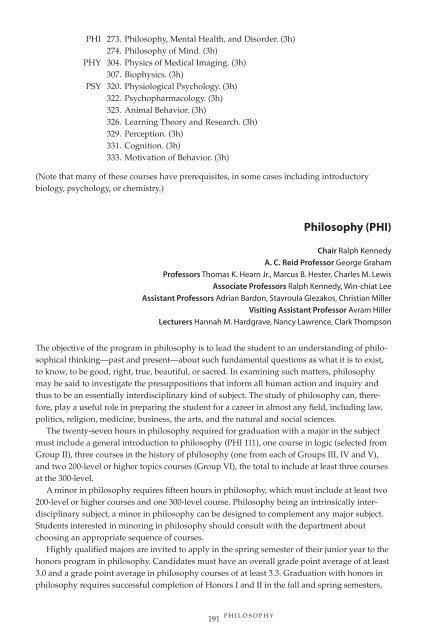theundergraduateschoo ls - Wake Forest University
theundergraduateschoo ls - Wake Forest University
theundergraduateschoo ls - Wake Forest University
You also want an ePaper? Increase the reach of your titles
YUMPU automatically turns print PDFs into web optimized ePapers that Google loves.
PHI 273. Philosophy, Mental Health, and Disorder. (3h)<br />
274. Philosophy of Mind. (3h)<br />
PHY 304. Physics of Medical Imaging. (3h)<br />
307. Biophysics. (3h)<br />
PSY 320. Physiological Psychology. (3h)<br />
322. Psychopharmacology. (3h)<br />
323. Animal Behavior. (3h)<br />
326. Learning Theory and Research. (3h)<br />
329. Perception. (3h)<br />
331. Cognition. (3h)<br />
333. Motivation of Behavior. (3h)<br />
(Note that many of these courses have prerequisites, in some cases including introductory<br />
biology, psychology, or chemistry.)<br />
P H I L O S O P H Y<br />
191<br />
Philosophy (PHI)<br />
Chair Ralph Kennedy<br />
A. C. Reid Professor George Graham<br />
Professors Thomas K. Hearn Jr., Marcus B. Hester, Charles M. Lewis<br />
Associate Professors Ralph Kennedy, Win-chiat Lee<br />
Assistant Professors Adrian Bardon, Stavroula Glezakos, Christian Miller<br />
Visiting Assistant Professor Avram Hiller<br />
Lecturers Hannah M. Hardgrave, Nancy Lawrence, Clark Thompson<br />
The objective of the program in philosophy is to lead the student to an understanding of philosophical<br />
thinking—past and present—about such fundamental questions as what it is to exist,<br />
to know, to be good, right, true, beautiful, or sacred. In examining such matters, philosophy<br />
may be said to investigate the presuppositions that inform all human action and inquiry and<br />
thus to be an essentially interdisciplinary kind of subject. The study of philosophy can, therefore,<br />
play a useful role in preparing the student for a career in almost any field, including law,<br />
politics, religion, medicine, business, the arts, and the natural and social sciences.<br />
The twenty-seven hours in philosophy required for graduation with a major in the subject<br />
must include a general introduction to philosophy (PHI 111), one course in logic (selected from<br />
Group II), three courses in the history of philosophy (one from each of Groups III, IV and V),<br />
and two 200-level or higher topics courses (Group VI), the total to include at least three courses<br />
at the 300-level.<br />
A minor in philosophy requires fifteen hours in philosophy, which must include at least two<br />
200-level or higher courses and one 300-level course. Philosophy being an intrinsically interdisciplinary<br />
subject, a minor in philosophy can be designed to complement any major subject.<br />
Students interested in minoring in philosophy should consult with the department about<br />
choosing an appropriate sequence of courses.<br />
Highly qualified majors are invited to apply in the spring semester of their junior year to the<br />
honors program in philosophy. Candidates must have an overall grade point average of at least<br />
3.0 and a grade point average in philosophy courses of at least 3.3. Graduation with honors in<br />
philosophy requires successful completion of Honors I and II in the fall and spring semesters,






